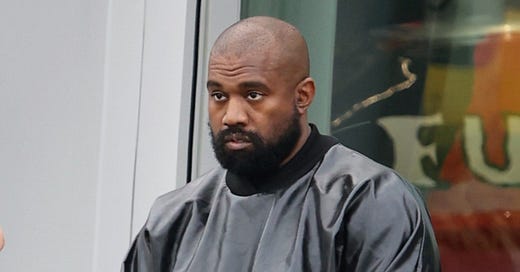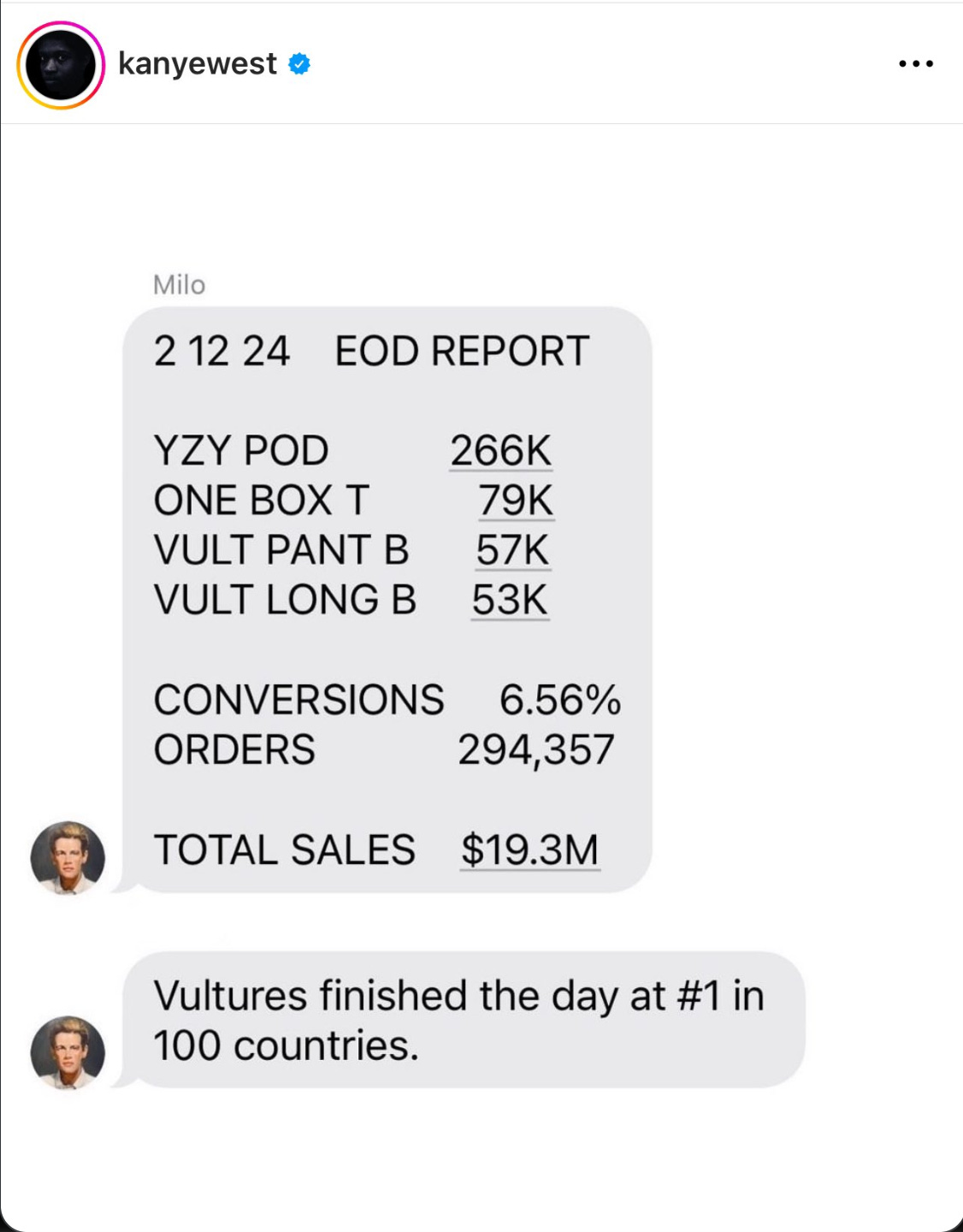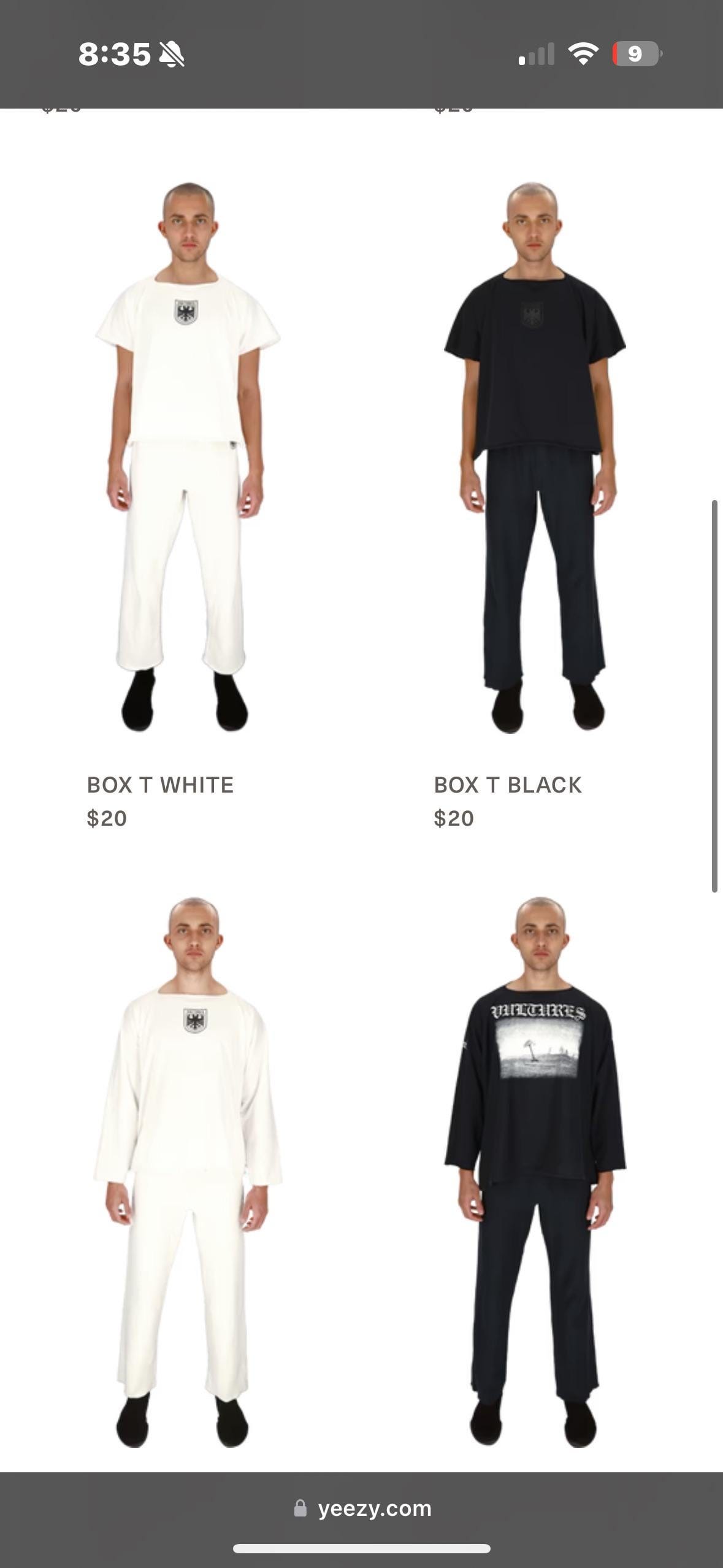the artist as a business
Kanye West, Super Bowl, growth hacker marketing, Taylor Swift, agents, financial freedom, lean tech startups, Andy Warhol...
Is the only path forward for artists working under techno capitalism to become entrepreneurs? Or at the very least learn how to play and succeed at the digital economy’s game of business?
I’ve been asking myself these questions in recent months because the actions of the world’s biggest artists suggest the answer, in both cases, is yes. We’ll get into the likes of Taylor Swift, Frank Ocean, and more at a later date, but for now, let’s focus on the artist formerly known as Kanye West (he goes by Ye now). Because for all his controversial statements over the past 10 years, I find none more consequential than this:
“Artists are businesses. We’re not just artists. Artists shouldn’t have managers, we should have CEOs.”
Kanye first posited this in 2017 and I’m growing pretty certain almost every move he’s made in public since then revolves around this one idea. Yes, even his ‘crazy’ and ‘offensive’ actions seem part of a grand business strategy. (More on that in a bit.) Before we go too far, two things: 1) Yes, Andy Warhol already did this stunt dissolving the line between art and commerce half a century ago and 2) Let’s reminds ourselves that back in 2017 Kanye was $53 million in debt. That’s a five and a three, like, together. As in, he owed a bank FIFTY-FREAKING-THREE MILLION DOLLARS. And bro, I don’t know about you, but that kind of debt would make me rethink some things. The interest alone…
Anyway, it seemed Kanye was rethinking things in that 2017 interview with Charlamagne tha God (to our non-rap/non-media friends, yes that’s his name, just go with it). He expressed frustration over how much he trusted every former agent or manager to handle the money side of things. “I was always told, ‘You’re an artist, you’re a rapper, we love you for the music, Ye, don’t think about the business.’” And he was hurt that all his new media and tech friends—name-dropping Drew Houston, the co-founder and CEO of Dropbox, a man now worth $2.2 billion—loved hanging out, supported the music, but none of them would help Kanye secure a valuation for Yeezy, his clothing and shoe company. It was Scooter Braun (Justin Bieber’s former manager and Taylor Swift’s sworn nemesis) who reached out and helped him do that.
“I felt like learning the valuation of my company and what I built was like a slave getting a social security number,” Kanye said. “I got my rights. I know I’m worth this much.”
He certainly discovered true financial freedom after this. Need I remind us that Kanye was worth over $2 billion just a couple years ago? Now I know you don’t need to be that smart to have $2 billion in this country, but you do need at least some brain for business to make $2 billion in this country. You don’t just slip, stumble, and fall ass-backward into that kind of money when you’re $53 million in debt, that’s for damn sure. At least not in this country anymore. This chart wouldn’t exist if you could.
So the artist is a business or whatever, cool. Like I said, it all feels very Warhol to me. But what really intrigues me is how the artist formerly known as Kanye has most become like a lean tech startup.
To explain, we should return to the Super Bowl. Yea, yea, it was a fun game and all, but what fascinated me was watching how our biggest artists used the platform as a business opportunity. Some of it was obvious, like Taylor Swift being in the spotlight as the celebrity girlfriend, and Usher performing the halftime show. And Beyonce was calculating as always, leveraging a telecommunications company to pay her millions of dollars so they could be associated with the Queen’s announcement of her new album.
Kanye did something different, something everyone pointed at and mocked, but he almost definitely made the most money here. He bought an ad spot for $7 million and recorded a crappy iPhone video from the back of a moving vehicle. He talked in a cartoon drawl that made him sound dumb, mentally impaired, like he really had lost his marbles. Then, he urged everyone to visit his new website Yeezy.com. “I got some shoes,” he said, “and mmmmmmmmmm … that’s it!” Commercial over.
But that wasn’t it! When you clicked on the website, there were all kinds of shirts, pants, and other fashion products you could buy, too. Even more intriguing, every one of these products was priced at $20. What a wonderful surprise as a fan! I should buy as much as I want at that price!
On social media the next day Kanye bragged that he’d sold 266,000 shoes (the Yzy pods) and made $19.3 million in first-day sales. Over the course of the week, he’d make $46 million total. And his new album was No. 1 in 100 countries.
It was all a brilliant stunt, straight from the growth hacker marketing playbook. What is growth hacker marketing? It’s an idea that originated in Silicon Valley and the basic premise, as Ryan Holiday defines it in Growth Hacker Marketing, is to throw out the traditional marketing playbook and prioritize only “what is testable, trackable, and scalable. Their tools are emails, data targeting, blogs, and platform APIs instead of commercials, publicity, and money.”
Here’s the most interesting part:
Growth hackers are the inventors, operators, and mechanics of a self-sustaining and self-propagating growth machine that can take a company not just from zero to one, but from one to a hundred or a hundred million.
The easiest example of this is something like Spotify Wrapped. At the end of each year, Spotify tells its users what was their most played songs, albums, and artists. Conveniently, Spotify gives you a pretty chart and graphic of all this data that you can share with friends on social media or the group chat to discuss and compare. And if you do that, congratulations, you have just done some free marketing for a multi-billion dollar company. You have used your social capital to spread a message that listening to music on Spotify is fun and worthwhile and anyone who isn’t on Spotify should probably join all this fun us Spotify users are having. I mean, it’s only $10.99 a month…
And here’s the thing: Spotify Wrapped is fun! Why wouldn’t you share this data with friends? This is exactly what makes growth hacker marketing so tricky and yet so effective.
Which brings us back to Kanye. His marketing genius is to say things and create content that produces such a strong emotional reaction in you, usually in a polarizing manner, that you feel compelled to post about it. For the commercial, I generally saw two reactions online: “lol, Kanye’s such a troll, hilarious bro” or “Wow, Kanye’s such a fuckin idiot who can’t even make a commercial right.” In both cases his message spreads and that message contained a very specific call to action: Go to Yeezy.com.
Customers of those $20 clothes and shoes may have noticed they all had long shipping times, between about 2-6 weeks. That’s because none of these products were sitting in a warehouse somewhere ready to be delivered. They were all made to order so no capital is wasted on products no one buys. At the same time, Kanye receives first-party data on what products his customers are buying or even checking out on the website.
Like growth hacker marketing, this is another move from the lean tech startup. Our friends here who work in tech are probably familiar with the notion of a “minimum viable product,” or MVP for short. Put simply, an MVP is the most basic version of a product that is still functional and usable for customers. Although you know it’s imperfect, you release the product in this form to test demand on the market before pouring future resources into its development.
Obviously this is the strategy for his fashion line, but the same goes for his music. Anytime Kanye releases an album now, he rents out stadiums across the country and hosts listening parties. Fans listen to the ‘beta’ version of the songs then, based on their feedback, Kanye returns to the studio and tweaks the record. And just like in a tech startup, Kanye’s albums get delayed again and again as he’s busy making changes in real time. Then he releases 2.0 and 3.0 versions so hardcore fans listen multiple times to check out all the tweaks he’s made and compare notes in online fan forums.
Kanye is not an idiot. With his business, he knows exactly what he is doing. Now, I’m of the opinion his artistry has suffered as a result. His last album was mid and most of what he’s produced in the past five or so years doesn’t deliver the same sonic impact as his best work. This unnerving cynicism underlies his recent work and comments, but at the same time, he works in a highly cynical industry. In an interview last month, Kanye shared two jokes he once heard from a manager in the entertainment industry. I think they provide all the insight into why artists like him feels the needs to take control of his business.
“The first joke he says is, ‘You know what I hate about artists? They take 80% of my money.’ The other joke they had is, ‘What would we do if artists figured out their own distribution?’ And the punchline is, we’d have to kill them.”







